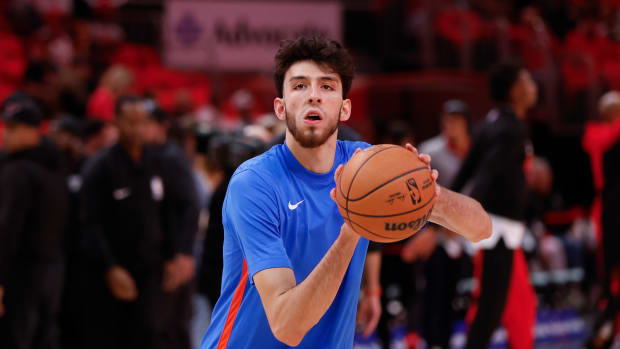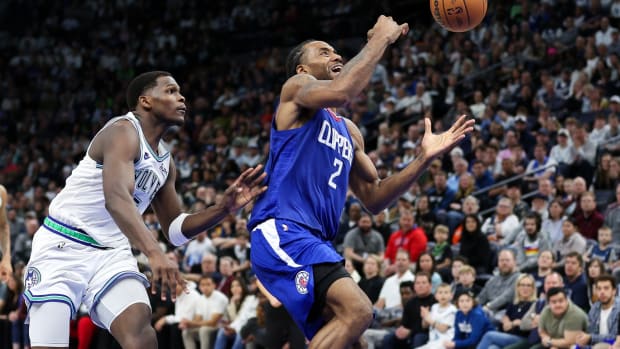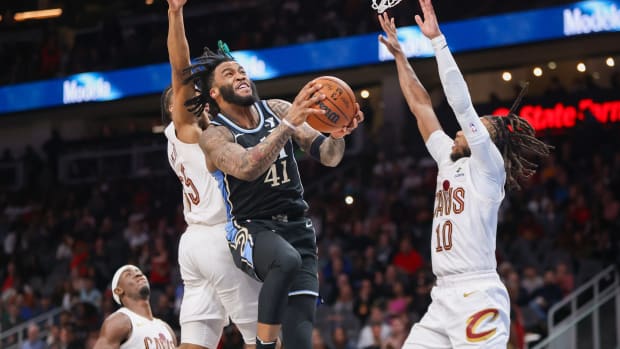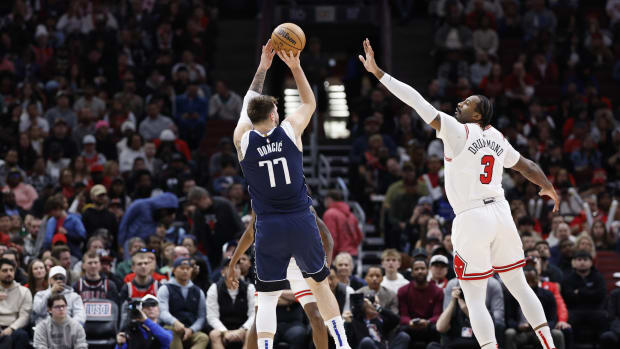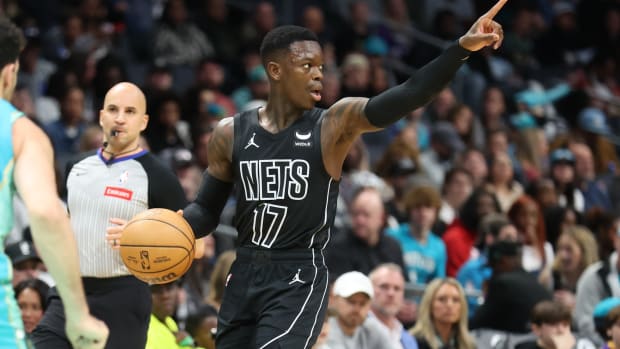
Give and Go: Measuring the fallout from Kobe Bryant's Achilles injury
Kobe Bryant is expected to miss six to nine months after Achilles surgery. (Jeff Gross/Getty Images)
Give And Go is a recurring feature in which The Point Forward’s Ben Golliver and Rob Mahoney bat an NBA topic du jour back and forth.
The Lakers' season took a devastating turn on Friday night when Kobe Bryant tore the Achilles tendon in his left leg. Bryant had surgery on Saturday and is expected to miss six to nine months. The Lakers' present and future will come to be defined by the after-effects of this single, hugely unfortunate break. Here, we chime in on how that process might unfold for the franchise.
1. With an eye to the immediate: What does Bryant's injury mean for the Lakers' playoff hopes?
Rob Mahoney: Friday's win over Golden State -- Bryant's final heroic feat before the arduous rehabilitation to come -- kept the Lakers one game ahead of Utah for eighth place in the Western Conference with two games to play. It's hardly a comfortable margin for the Lakers because the Jazz own the tiebreaker by virtue of winning the season series. As a result, the Lakers are more or less required to win at least one of their final two games if they hope to hold on to a postseason slot. They play host to the Spurs on Sunday and the Rockets on Wednesday.
Tony Parker's return offers good reason for the Spurs to run through these final games at full speed, as does the possibility that San Antonio could overtake Oklahoma City for the top seed in the West (the Thunder lead by a half-game and have the tiebreaker). Houston has plenty of incentive to compete and win. The Rockets stand just a half-game behind the Warriors for the West's sixth seed -- and a chance at dodging the Spurs and Thunder in the first round. Houston possesses the tiebreaker over Golden State.
And beyond that, these Lakers will undoubtedly try their damnedest to finish out the season and honor their fallen teammate, but are nonetheless subject to the immense limitations of potentially missing their two primary shot creators in Bryant and Steve Nash, who, according to coach Mike D'Antoni, will be a game-time decision. That's a painful turn for a team that has only survived this late stretch of the season because of its offense, as L.A. will have to make do as a score-first team without Bryant's incredible utility, bulk production and end-game bailout act.
Just about the only thing working in the Lakers' favor is the Jazz's final two games aren't exactly sure wins. Utah is only 12-27 on the road and will visit Memphis on Monday and Minnesota on Wednesday. Still, it's not hard to imagine the Jazz's splitting those two games (perhaps by beating the Timberwolves again, as they did Friday) while the Lakers drop both games -- an outcome that would put Utah in the playoffs and send the Lakers home with the same 43-39 record.
Ben Golliver: The math part doesn't changethanks to L.A.'s crazy late-game win over Golden State. Two games left for both teams. If the Lakers go 2-0, they are in no matter what. If they go 1-1, they are in as long as the Jazz lose at least once. And if they go 0-2, they are in if the Jazz also go 0-2. Conversely, the Jazz are in if they go 2-0 and the Lakers lose at least once, or if they go 1-1 and the Lakers lose out.
The Lakers have played just two games without Bryant this season, going 1-1 in March when he was sidelined with an ankle injury. The loss was the scary part: L.A. scored just 76 points at Phoenix (the worst team in the West), although Pau Gasol, who has had a bit of a resurgence over the last few weeks, also sat because of injury.
While Bryant's spotty defense drew questions and heckles all season, few players can match his elite work on offense. The Lakers are more than seven points per 100 possessions better when he's on the court compared to when he's on the bench. He has kept them afloat in countless games down this endless push for the playoffs. His replacement, Jodie Meeks, is a 39.3 percent shooter whose 11.7 Player Efficiency Rating is roughly half of Bryant's (23) and who has scored at least 20 points just twice this season. Gulp.
It would seem particularly important for Meeks to find his scoring touch with Nash either out or limited by hip and hamstring injuries that have kept him out the last six games. If not Meeks, then someone, anyone, must get hot on the perimeter, whether that's Steve Blake, Metta World Peace or some other hero yet to be named. The Lakers' upcoming opponents both boast top-seven offenses that are also top seven among three-pointers attempted; it's unlikely that twin-towers performances from Gasol and Dwight Howard will be enough firepower to keep up in both games.
Those are the scenarios and the basketball challenges. There's a major, major, major mental component at work, too. Bryant's absence offers the remaining Lakers the perfect excuse to turn in for the season and provides the possibility for negative thoughts about what a playoff series against the likely top seed, Oklahoma City, would look like without Bryant (nasty, brutish and short). Who is going to blame the Lakers now for missing the playoffs? Who is going to expect anything longer than a five-game series against Oklahoma City?
Those are tough but unavoidable questions that amount to a pride check for Gasol, Howard and company. Are they willing to settle with those excuses dangling in front of them? Are they capable of getting up from this type of blow to plow through a finish line that offers only further adversity in the form of the Thunder? We'll see.
2. Bryant's recovery could extend months into the 2013-14 season. How might this turn of events influence Dwight Howard's impending free agency?
Ben Golliver: Attempting to read Howard's mind is like looking into a cereal bowl of Trix-tinted milk in search of a Van Gogh. I've been hard on Howard for his indecision for years, but Bryant's injury is such a major circumstance that he is absolutely well within his right to reassess his future with the Lakers once their season ends.
This isn't what Howard thought he was getting into. For starters, the Lakers were thought to be contenders this year and next year. That hasn't yet materialized this season and next season's outlook is significantly bleaker than it was 24 hours ago. Howard is 27 now; this is his winning window. Wanting a situation that gives him the best opportunity to compete for a title over the next five years is and has been a reasonable desire.
This summer, he will have to make a commitment to a team and get to work on making those goals a reality. Choosing the Lakers would require a second full season of patience that could pay off huge in 2014 free agency, when L.A. will be primed and ready financially to be the top destination for a host of big names. That's a solid option. But are there better ones out there? For instance, a team like Houston, playoff-bound with talent on hand, is probably pretty tempting, especially right now.
We shouldn't rush to get ahead of ourselves: The worst time to formulate such a weighty decision is in the immediate aftermath of a traumatic event, and Howard will have months to consider his options and get a better idea of how Bryant is progressing in his rehabilitation.
Rob Mahoney: Oddly enough, given what we know of Howard's fickle wants, I don't think Bryant's status will influence his offseason decision much. The Lakers are still a glamour franchise in an incredible market intent on paying him more money than any other team, while making him the crux of their operation going forward. That combination checks all of Howard's boxes whether Bryant is in the picture or not.
The likelihood of L.A.'s contending next season plummets as we account for the likelihood of Bryant's being out or in lesser form for the whole season. But Howard would be turning down a tremendous opportunity on the basis of wanting to compete immediately. This has been a trying year for most every Laker and I highly doubt that Howard is really enjoying himself under the team's current circumstances. But next year would bring an even bigger role in the offense on a huge new contract. I suspect that those two factors may be enough to entice Howard to stay.
3. It's a bit cruel to broach the subject after such a gut-punch of an injury, but it needs be asked: Should the Lakers consider using the amnesty clause to shed themselves of the final year (worth $30.4 million) of Bryant's contract?
Rob Mahoney: The amnesty clause is a valuable tool for situations just like this. Bryant's salary will help cause both a salary-cap logjam and a luxury-tax nightmare for the Lakers next season. As it stands, L.A. figures to almost double its overall salary -- which projects to be a little more than $100 million -- with a matching tax bill, in no small part because Bryant is due a massive sum of money for a season that is now in question for him. It's unfortunate to have to think about Bryant's injury in these terms, but it would help save L.A. an astounding amount of money (and offer added roster flexibility) if the Lakers made the difficult choice to amnesty him in July.
If that were to happen, the Lakers would still be responsible for paying Bryant's $30.4 million in salary but would at the very least see their tax payment slashed. For his part, Bryant would briefly go through an amnesty waiver process (in which teams under the cap could bid any amount they wish to sign him for the season) before becoming an unrestricted free agent in the summer of 2014 -- just as would have been the case if his contract had expired as intended.
The sheer amount of savings to be had makes this an idea the Lakers must entertain, but it still strikes me as both a practical impossibility and a potential PR disaster. It's certainly possible that Bryant and the Lakers could mutually discuss this option as a way to make L.A. a better team going forward, but I find it hard to believe that Bryant would consent to throwing away his entire season (or suiting up for another team) while his rehabilitation is just beginning. I can't think of anything more fundamentally unlike Bryant. We should fully expect him to work his tail off with the goal of returning as early as possible in 2013-14, and yet the amnesty option would force Bryant to 1) sit out the season or 2) be claimed by another team. I suppose that Bryant could always refuse to report if a team under the cap really did claim him, but at the point of chasing that hypothetical we start to deal with these cogs as if they were cold, disparate parts rather than fiercely competitive player and immensely proud franchise.
There's some sense to the notion of amnestying Bryant if we approach the option solely as a thought experiment. But the more we account for the specifics of the principles involved -- and the risk if the league were to catch wind of some preconceived agreement for Bryant to return in 2014 -- the less plausible and appealing the amnesty clause becomes.
Ben Golliver:































